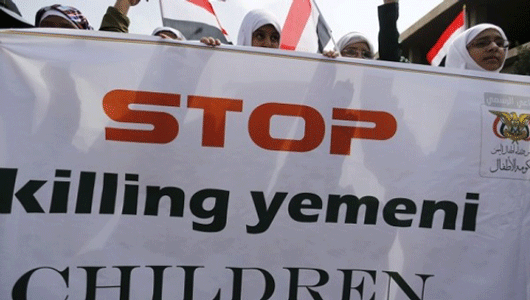
Local Editor
The secretary-general of the United Nations has defended his decision to remove Saudi Arabia from a blacklist on children’s rights.
United Nations Secretary-General Ban Ki-moon admitted Thursday that he effectively forgave Saudi abuses of children’s rights in Yemen to secure funding for humanitarian missions for kids across the region.
Allies of Saudi Arabia piled pressure on the U.N. chief over the blacklisting of a Saudi-led coalition-supported by the United States-for killing children in Yemen, with Riyadh threatening to cut Palestinian aid and funds to other U.N. programs, diplomatic sources said Tuesday. Without the aid, said Ban, "Children already at risk in Palestine, South Sudan, Syria, Yemen and so many other places would fall further into despair."
The U.N. announced on Monday it had removed the coalition from the child rights blacklist-released last week-pending a joint review by the world body and the Saudi-led coalition of cases of child deaths and injuries during the war in Yemen. Over 1,000 children have been killed or injured by the coalition’s airstrikes.
The removal prompted angry reactions from human rights groups, which accused Ban of caving in to pressure from powerful countries while noting that Saudi Arabia has accounted for 60 percent of the deaths in the war in Yemen. They said that Ban, currently in the final year of his second term, risked harming his legacy as U.N. secretary-general and the credibility of the United Nations.
An open letter signed by dozens of civil society groups on Wednesday expressed shock that Ban was "capitulating" on the list, which should be " based on evidence, not politics."
Speaking on condition of anonymity with Reuters, the sources said Ban’s office was bombarded with calls from Gulf Arab foreign ministers, as well as ministers from the Organization of Islamic Cooperation, after the blacklisting was announced last week.
"Bullying, threats, pressure," is how one diplomatic source characterized the lobbying campaign, adding that it was "real blackmail."
The source said there was also a threat of "clerics in Riyadh meeting to issue a fatwa against the U.N., declaring it anti-Muslim, which would mean no contacts of OIC members, no relations, contributions, support, to any U.N. projects, programs."
Ban said in his speech Thursday that "It is unacceptable for member states to exert undue pressure," but that, "at the same time, I also had to consider the very real prospect that millions of other children would suffer grievously if, as was suggested to me, countries would de-fund many U.N. programs."
"We will assess the complaints that have been made, but the content will not change," he said.
The Saudi ambassador to the U.N. said that Ban’s decision is "irreversible and unconditional."
Source: News Agencies, Edited by Website Team